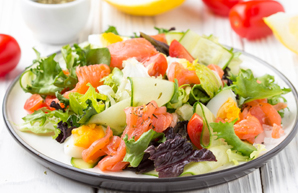Complex carbs
Carbohydrates promote the production of the neurotransmitter serotonin, a calming brain chemical. A study in the journal Nutrients found that increasing dietary carbs as part of a healthy whole-food diet for eight weeks lowered levels of salivary cortisol (a stress hormone).
Simple carbs (such as sweets and sweetened beverages) lead to a spike in serotonin, then a rapid drop. But complex carbs take longer to digest and release a steady supply of the feel-good chemical.
"Look to include oatmeal and whole-grains breads, pastas and cereals in your diet," says Gauteng dietitian Debby Watkins. "And eat regularly to help with fluctuations in blood sugar."
Fatty fish
Fish such as salmon and tuna are rich in omega-3 fatty acids, which can help prevent surges in stress hormones and protect against depression as well as heart disease. Aim to have a serving of fatty fish twice a week.
"If you don’t eat oily fish, consider an omega-3 supplement," says Watkins. "Or have a handful of walnuts or flax seeds daily."
Leafy greens
Too little magnesium in your diet can compound the effects of stress. Leafy greens are loaded with it, especially spinach, kale, collard greens, turnip greens and mustard greens. A single cup of cooked spinach has around 158mg of magnesium – nearly 40% of the recommended daily intake.
Organ meats
Liver, kidney and heart meats are high in B vitamins, especially B12, B6, riboflavin and folate, which are all important in controlling stress. They are vital for the production of neurotransmitters such as serotonin and dopamine, which help regulate mood. Just 85g of beef liver provides about half of the vitamin B needs of the average adult for a day.
If you don’t fancy beef, consider B vitamin supplements. These were found in a review of 18 studies to lower stress levels and improve mood.
Eggs
Whole eggs are a concentrated source of vitamins, minerals amino acids and antioxidants required for a healthy response to stress. They contain tryptophan (an amino acid that helps create serotonin), and choline, which is found in high quantities in just a few foods.
One large egg has almost 140mg of choline in its yolk (there’s none in egg whites). Animal studies suggest choline supplements may help stress responses and improve mood.
Oranges
These are packed with vitamin C (ascorbic acid), which studies suggest can lower levels of stress hormones and strengthen immunity. A recent study in The Journal of Nutritional Biochemistry reported that ascorbic acid improved recovery from mental stress, low mood and anxiety.
Oranges are a convenient and delicious source of vitamin C (one orange packs about 53mg per 100g), but other sources are even higher in it. A guava has 228mg per 100g, kiwi fruit 93mg, kale 120mg, broccoli 89mg, brussels sprouts 85mg and bell peppers 80mg.
"Eating a variety of vegetables, fruit, whole grains, legumes and enough protein and dairy is your best protection against stress and other ills," says Watkins.
Do you need a little boost to get you on the path to feeling more relaxed? Click here to view our stress management vitamins and supplements page.

